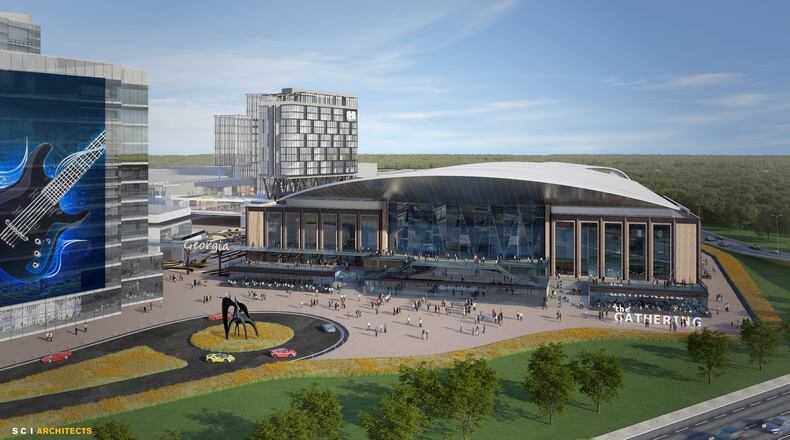A rejected referendum in a Phoenix suburb could give hope to Georgians yearning for professional hockey to return. But it’s too soon to tell if the puck will drop in metro Atlanta.
The Arizona Coyotes were delivered a cross-check Tuesday night when voters in Tempe voted down the franchise’s proposal to build a new arena and entertainment district. The team’s ownership indicated the franchise could move if the vote was rejected, putting multiple hockey-starved media markets — including metro Atlanta — on alert.
Last month, a development team led by an Atlanta area auto dealer magnate unveiled plans for a $2 billion arena and live-work-play district called the Gathering at South Forsyth that could house an NHL team. The project, 30 miles north of downtown Atlanta, centers around an 18,000-plus seat arena, some 2,400 apartments, lodging, and space for restaurants, retail and offices.
Representatives of the Gathering’s lead booster, Krause Auto Group CEO Vernon Krause, have said the project is viable with or without pro hockey.
The development team has faced criticism for not disclosing whether it will seek taxpayer funds to support the project. Other critics have raised concerns about increased congestion, the county’s lack of public transportation and the site’s distance from Atlanta.
It is also not a given metro Atlanta would be granted a third opportunity to host an NHL franchise following the failures of the former Flames and Thrashers franchises.
NHL Commissioner Gary Bettman said in March that his league doesn’t have plans to expand beyond its current 32 franchises, leaving relocation as the most likely option for cities looking to snag a team. In response to the failed referendum in Tempe, Bettman released a statement expressing his disappointment.
“We are going to review with the Coyotes what the options might be going forward,” the statement said.
The Coyotes went through bankruptcy in 2009, and bounced around the Phoenix area. They currently play in a 5,000-seat college arena.
The team sought more than $200 million in public financing for infrastructure to help create a $2.1 billion arena and entertainment district on the site of what’s now a landfill. An analysis by journalist Neil deMause, who studies stadium deals, estimated that other inducements would bring the public investment to more than $500 million over three decades.
In exchange for the incentives, the Coyotes would have transformed the 46-acre property into a 16,000-seat arena, nearly 2,000 apartments and various other live-work-play attractions. But voters rejected a trio of ballot items Tuesday, all of which needed majority support for the Coyotes project to move forward.
When the Thrashers left for Canada after the 2011 season, it left metro Atlanta as one of the largest North American markets without an NHL franchise.
Atlanta would have to compete with the likes of Salt Lake City, which has never had a professional hockey team, and Houston and Quebec City, Canada — which had professional teams leave their cities in the 1970s and 1990s, respectively. No city has ever gotten a third chance at an NHL franchise.
Credit: The Gathering at South Forsyth
Credit: The Gathering at South Forsyth
Neither Krause nor anyone else from the Gathering development team was made available for an interview Wednesday.
Forsyth County commissioners said they soon want to conduct an independent analysis into the potential economic impact of the Gathering project, but they’re awaiting more specifics from the development team before they can proceed.
A study obtained by The Atlanta Journal-Constitution showed the Gathering’s arena with a NHL franchise would generate $6.6 million per year in county sales taxes and nearly $18 million in annual state tax revenues. Economic studies for sports arenas and stadiums often receive broad pushback from economists, who argue they often inflate the positives while overstating the return on taxpayer dollars.
That study did not include any analysis of potential public costs for the arena, such debt service, security or traffic management.
Stafford Sports, which commissioned the study, declined to release other internal studies conducted for the surrounding mixed-use district and a hockey-less arena.
About the Author
Keep Reading
The Latest
Featured




